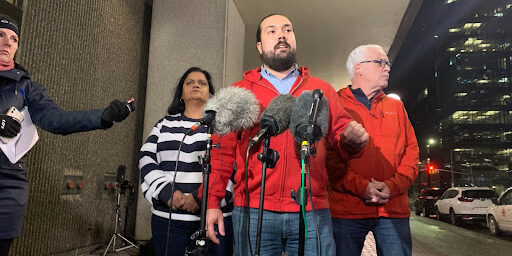The Public Service Alliance of Canada (PSAC) started strike action this morning after they were unable to reach a tentative agreement with the government before yesterday’s 9 p.m. strike deadline. PSAC says this is the largest strike against any single employer in Canadian history.
Negotiations began almost two years ago in June 2021 and reached an impasse in May 2022. Wages, remote work and equity training are among the key issues on the bargaining table.
PSAC members working for the Treasury Board as well as the Canadian Revenue Agency (CRA) are on the picket lines until a tentative agreement is reached. More than 155,000 public servants are on strike.
READ MORE: PSAC prepared to start one of Canada’s largest strikes ever
At a press conference soon after the strike deadline, PSAC representatives refused to comment on the specifics of issues being negotiated. However, Chris Aylward, PSAC National President, did disclose that the government and PSAC are “still a ways apart.”
“As we begin this historic strike, PSAC bargaining teams will remain at the table night and day as they have been for weeks,” Aylward said in a press release. “We’re ready to reach a fair deal as soon as the government is ready to come to the table with a fair offer.”
The 155,000 members on strike make up almost a third of the federal public service, according to PSAC. Canadians can expect major delays or full stoppages to services.
In a media release, the union said to expect a complete halt of the tax season; disruptions to employment insurance, immigration, and passport applications; interruptions to supply chains and international trade at ports; and slowdowns at the border with administrative staff on strike.
Aylward previously told rabble.ca that he hoped a strike could be avoided.
“If we do go on strike, many Canadians are gonna suffer and we don’t want to do that,” Aylward said to rabble.ca in June 2022. “We don’t want to withdraw our services, providing that day to day essential service that Canadians rely on.”
However, almost a year later, it has come to just that. Since the union declared an impasse in May 2022, Aylward has repeatedly said that the government has the ability to avoid a strike. Now, it seems as though the employer has been unable to meet workers’ needs.
“Now more than ever, workers need fair wages, good working conditions and inclusive workplaces. And it’s clear the only way we’ll achieve that is by taking strike action,” Aylward said in a press release.
The Federal government is the largest employer in Canada, Aylward previously told rabble. As such, their labour practices set an example for other employers across the country. After PSAC’s bargaining demands fell on deaf ears for more than a year, the example set seems to be a bleak one.
Picket lines can be found in more than 250 locations across the country. Members of the union and public supporters can find the nearest picket line using PSAC’s picket finder tool.
“The members are pumped,” Aylward said. “The members, as I said last week, spoke loudly. They spoke very clearly. Our members are prepared to fight for a good, decent and fair collective agreement.”



